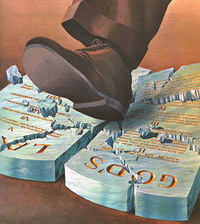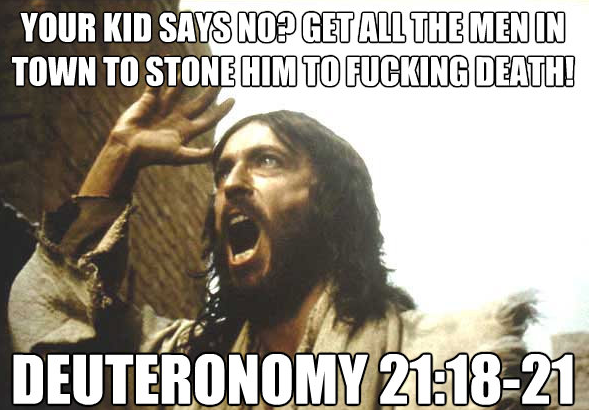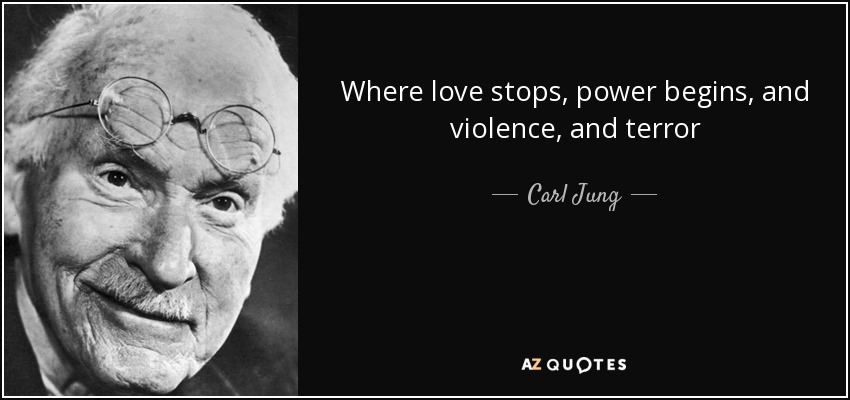
Abolition Of The Law
First In A Series Of Catholic Lectionary Reflections
Catholic Lectionary
The second reading from The Catholic Lectionary for Sunday, July 19, 2015, is taken from Paul's letter to the Ephesians.
Chapter 2
"For he is our peace, he who made both one
and broke down the dividing wall of enmity, through his flesh,
abolishing the law with its commandments and legal claims,
that he might create in himself one new person in place of the two,
thus establishing peace."
and broke down the dividing wall of enmity, through his flesh,
abolishing the law with its commandments and legal claims,
that he might create in himself one new person in place of the two,
thus establishing peace."
Although I readily interpret Scripture in rich context (linguistic, historic, anthropological, rhetorical etc.) there are times when biblical declarations are so straightforward that they do not admit contextual examination.
In Ephesians, for example, Paul of Tarsus says with no minced words: "Christ Jesus abolished the law with its commandments and legal claims."
By way of reply it is often argued that Jesus abolished The Old Law only and in this regard we find frequent citation of Jesus' comments in Matthew 5 at the very beginning of The Sermon On The Mount:
“You must not think I have come to abolish the Law or the Prophets; I have not come to abolish them but to complete them. Indeed, I assure you that, while Heaven and earth last, the Law will not lose a single dot or comma until its purpose is complete. This means that whoever now relaxes one of the least of these commandments and teaches men to do the same will himself be called least in Heaven. But whoever teaches and practices them will be called great in the kingdom of Heaven. For I tell you that your goodness must be a far better thing then the goodness of the scribes and Pharisees before can set foot in the kingdom of Heaven at all!" (Phillips Translation: https://www.biblegateway.com/passage/?search=Matthew+5&version=PHILLIPS)
Clearly, Jesus' words can be finessed to mean many things according to exegetical interpretation of The Law.
Is Yeshua referring to all of the Old Testament's 613 mitzvot, including the command that "all the men of the town stone rebellious children to death?"
A List of the 613 Mitzvot (Commandments)
 http://www.jewfaq.org/613.htm
http://www.jewfaq.org/613.htm

The entire Deuteronomic text:
https://www.biblegateway.com/passage/?search=Deuteronomy+21%3A+18-21&version=CJB

The entire Deuteronomic text:
https://www.biblegateway.com/passage/?search=Deuteronomy+21%3A+18-21&version=CJB
Or is he referring to The Law as embedded in the actual workings of Universe?
Paul, on the other hand, makes it very difficult to circumvent his straightforward statement that "Jesus abolished the law with its commandments and legal claims."
The institutional church -- doing what institutions do -- does not overly value what its founders actually said, but rather represents its own pronouncements as infallible and central
Matthew 15: God's Law And Human Tradition. How Readily We Let The Latter Trump The Former
http://paxonbothhouses.blogspot.com/2015/05/matthew-15-gods-law-and-human.html
http://paxonbothhouses.blogspot.com/2015/05/matthew-15-gods-law-and-human.html
Jesus Rails Against Human Traditions Of "Our Great Leaders Who Lived Long Ago"
http://paxonbothhouses.blogspot.com/2014/08/jesus-rails-againt-human-traditions-of.html
http://paxonbothhouses.blogspot.com/2014/08/jesus-rails-againt-human-traditions-of.html
The institutional church would have us believe "there is no problem in Houston" - or elsewhere - and that "the authorities" can create whatever laws they wish -- whether proscription of meat-eating on Friday or damnation in A Lake of Eternal Fire if one uses artificial birth control.
Still, we must deal with Paul...
"Christ Jesus abolished the law with its commandments and legal claims."
Aftherthought: What if "the fulfillment of the law in Jesus' mind "hangs on" The Great Commandment set forth in Matthew 22?
34Hearing that Jesus had silenced the Sadducees, the Pharisees got together. 35One of them, an expert in the law, tested him with this question: 36“Teacher, which is the greatest commandment in the Law?”
37Jesus replied: “ ‘Love the Lord your God with all your heart and with all your soul and with all your mind.’c 38This is the first and greatest commandment. 39And the second is like it: ‘Love your neighbor as yourself.’d 40All the Law and the Prophets hang on these two commandments.”
Pope Francis: What Christianity Looks Like When Believers Realize "God Is Love"
http://paxonbothhouses.
"Love Covers A Multitude Of Sins"
"Love Covers A Multitude Of Sins"
"Love Your Enemies. Do Good To Those Who Hate You," Luke 6: 27-42
Yeshua Excoriates Fellow Pharisees: "The Woe Passages"
http://paxonbothhouses.
"Martin Luther King Jr. On Hatred, Violence, Love and Jesus "The Way"
http://paxonbothhouses.
"Who Were The Tax Collectors In Yeshua's Time"
http://paxonbothhouses.
"Are Highly Religious People Less Compassionate?"
http://paxonbothhouses.
"Martin Luther King Jr. On Hatred, Violence, Love and Jesus "The Way"
http://paxonbothhouses.
"Who Were The Tax Collectors In Yeshua's Time"
http://paxonbothhouses.
"Are Highly Religious People Less Compassionate?"
http://paxonbothhouses.
Dorothy Day: “I really only love God as much as I love the person I love the least.”
http://paxonbothhouses.
"You can safely assume you’ve created God in your own image
when it turns out God hates all the same people you do."
Fr. Tom Weston S. J.
"Love and do what you will."
St. Augustine
Fr. Tom Weston S. J.
"Love and do what you will."
St. Augustine


No comments:
Post a Comment